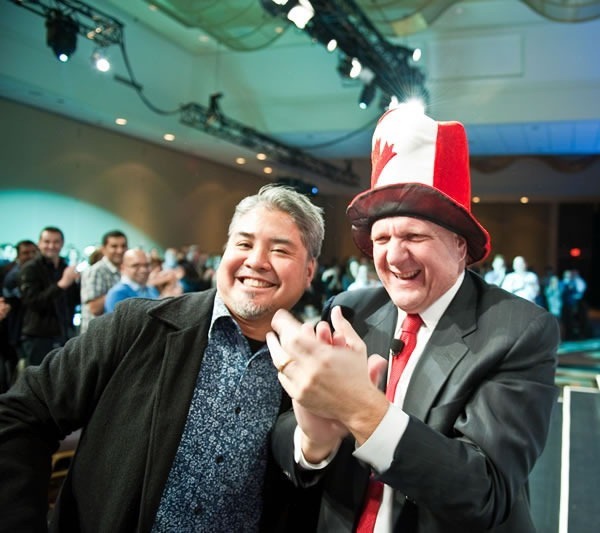
Me and Steve Ballmer at the Canadian Windows 7 launch, October 2009.
The Wall Street Journal’s recent article on Steve Ballmer’s upcoming departure from Microsoft says that it wasn’t a firing, but that he was getting strong pressure to leave from the board, who felt that he wasn’t making the necessary changes quickly enough. Among the rank-and-file, the feeling was the same, as a story from my last days at The Empire:
Certain identifying details in this story have been changed to protect the innocent. Namely, me.
“So,” said one Microsoft manager, well into one of those post-party parties at the 2011 Microsoft MVP Summit, in those wee hours of the morning when the last shreds of careerist pretense dissolve in Glenlivet and the candor comes out, “what do you think of Ballmer?”
Standard Operating Procedure at Microsoft is that the highest-level person in a group of dining or drinking Microsofties pays and expenses. Like World of Warcraft, Microsoft has numbered levels. Also like World of Warcraft, the fun begins at level 60. I was a level 61, these guys were level 63, and I was enjoying scotches on their expense accounts.
“He’s got to go,” said another manager.
“Oh yeah,” said the one who posed the question.
“Probably,” said another, with a look on his face that suggested that he was wondering if this conversation would come back to haunt him at some later date, when a promotion to the next level was on the line. At Microsoft, you’re encouraged to think about that next rung on your career ladder all the time.
Ballmer’s decision to leave was a tough one, especially for a guy who really, truly, and enthusiastically loves the company with a passion that I didn’t often see inside Microsoft Canada’s walls (Redmond was a little different, but in the Toronto office, it was like a medieval Italian village, and not in the good way). I know a lot of people who could never make that statement “At the end of the day, we need to break a pattern. Face it: I’m a pattern” in public, never mind in those quiet moments during a long dark night of the soul.
I’ll leave it to Alex Wilhelm at TechCrunch to summarize:
Ballmer was an imperfect CEO, but his final years will be considered his legacy, and I think that the changes he made to the company that he viscerally loves will bear out as generally correct. He initiated a new business model, began to reform key product lines to protect revenue streams and meet market requirements, turned the company into a respectable, if still flawed, hardware company, and retooled its executive layout to prevent it from shredding itself through internecine warfare as it has for so long.
Yes, there was Vista, Zune, Kin and a host of other flops under his tenure. But the Microsoft of today is the strongest that I can remember it being, and that’s not a bad note for Ballmer to leave on.